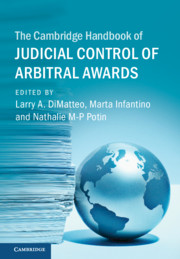Book contents
- The Cambridge Handbook of Judicial Control of Arbitral Awards
- The Cambridge Handbook of Judicial Control of Arbitral Awards
- Copyright page
- Dedication
- Concise Contents
- Contents
- Contributors
- Preface
- Part I Vacating Commercial Arbitration Awards
- Part II Enforcing Commercial Arbitration Awards
- Part III Scope and Interpretation of Arbitration Clauses
- Part IV Judicial Control of Arbitral Awards
- 10 Judicial Control of Arbitral Awards in Argentina
- 11 Judicial Control of Arbitral Awards in Australia
- 12 Judicial Control of Arbitral Awards in Bulgaria
- 13 Judicial Control of Arbitral Awards in Mainland China
- 14 Certain Aspects of Judicial Control of Arbitral Awards in France
- 15 Commercial Arbitration in Germany
- 16 Judicial Control of Arbitral Awards in Italy
- 17 Judicial Control of Arbitral Awards in Nigeria
- 18 Judicial Control of Arbitral Awards in Poland
- 19 Judicial Control of Arbitral Awards in Russia
- 20 Judicial Control of Arbitral Awards in Spain
- 21 Judicial Control of Arbitral Awards in Switzerland
- 22 Judicial Control of Arbitral Awards in Ukraine
- 23 Judicial Control of Arbitral Awards in the United Kingdom
- 24 Judicial Control of Arbitral Awards in the United States
- Part V Summary and Findings
22 - Judicial Control of Arbitral Awards in Ukraine
from Part IV - Judicial Control of Arbitral Awards
Published online by Cambridge University Press: 08 October 2020
- The Cambridge Handbook of Judicial Control of Arbitral Awards
- The Cambridge Handbook of Judicial Control of Arbitral Awards
- Copyright page
- Dedication
- Concise Contents
- Contents
- Contributors
- Preface
- Part I Vacating Commercial Arbitration Awards
- Part II Enforcing Commercial Arbitration Awards
- Part III Scope and Interpretation of Arbitration Clauses
- Part IV Judicial Control of Arbitral Awards
- 10 Judicial Control of Arbitral Awards in Argentina
- 11 Judicial Control of Arbitral Awards in Australia
- 12 Judicial Control of Arbitral Awards in Bulgaria
- 13 Judicial Control of Arbitral Awards in Mainland China
- 14 Certain Aspects of Judicial Control of Arbitral Awards in France
- 15 Commercial Arbitration in Germany
- 16 Judicial Control of Arbitral Awards in Italy
- 17 Judicial Control of Arbitral Awards in Nigeria
- 18 Judicial Control of Arbitral Awards in Poland
- 19 Judicial Control of Arbitral Awards in Russia
- 20 Judicial Control of Arbitral Awards in Spain
- 21 Judicial Control of Arbitral Awards in Switzerland
- 22 Judicial Control of Arbitral Awards in Ukraine
- 23 Judicial Control of Arbitral Awards in the United Kingdom
- 24 Judicial Control of Arbitral Awards in the United States
- Part V Summary and Findings
Summary
Upon the dissolution of the Soviet Union in 1991, Ukraine as a young independent state faced many challenges including the proper administration of trade disputes with foreign parties. For a certain period there were no such institutions that could resolve these disputes. To prevent the creation of a legal vacuum, the Parliament of Ukraine, along with the establishing of the foreign trade legal framework for Ukrainian nationals and adopting the Law on Foreign Economic Activity,1 recommended that the Ukrainian Chamber of Commerce and Industry (UCCI) establish a permanent arbitration body for prompt and efficient consideration of “foreign economic disputes.” For this purpose, on August 11, 1992, the International Commercial Arbitration Court (ICAC) and the Maritime Arbitration Commission (MAC)2 were created. However, almost from the very inception both institutions could hardly operate because of lack of legal basis for their functioning. To improve this complicated situation, the Law on International Commercial Arbitration3 (the International Arbitration Statute; ICA Law) was adopted on February 24, 1994 (effective April 20, 1994).4
Keywords
- Type
- Chapter
- Information
- The Cambridge Handbook of Judicial Control of Arbitral Awards , pp. 352 - 372Publisher: Cambridge University PressPrint publication year: 2020



